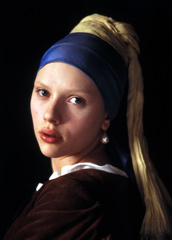
Profile & Interview: Scarlett Johansson
by Carlo Cavagna
LEFT: Scarlett Johansson as the subject of painter Johannes Vermeer's masterpiece, "Girl with a Pearl Earring."
 |
Profile & Interview: Scarlett Johansson by Carlo Cavagna
LEFT: Scarlett Johansson as the subject of painter Johannes Vermeer's masterpiece, "Girl with a Pearl Earring." |
|
![]() o actress is hotter than Scarlett Johansson right now. With Lost in Translation and Girl with a Pearl Earring, she has captured the attention of the film industry and the hearts of critics. At just nineteen years of age, she has earned two BAFTA nominations, two Golden Globe nominations, a Boston Society of Film Critics win for Best Actress (for Lost in Translation), the New Generation Award from the Los Angeles Film Critics, and the Upstream Prize from the Venice Film Festival.
o actress is hotter than Scarlett Johansson right now. With Lost in Translation and Girl with a Pearl Earring, she has captured the attention of the film industry and the hearts of critics. At just nineteen years of age, she has earned two BAFTA nominations, two Golden Globe nominations, a Boston Society of Film Critics win for Best Actress (for Lost in Translation), the New Generation Award from the Los Angeles Film Critics, and the Upstream Prize from the Venice Film Festival.
For awhile, it looked like the flavor of the year would be Kiera Knightley. Certainly, Knightley has accounted for more box office, with Pirates of the Caribbean leading the way. But Johansson is the one making people sit up and take notice. Though neither Oscar nor Screen Actors Guild nominations were forthcoming, she is unquestionably the buzz around town in Hollywood. She already has a new movie in theaters (The Perfect Score, a teen caper shot prior to either Lost in Translation or Pearl Earring) and has just completed a lead performance in A Love Song for Bobby Long, with John Travolta. Now she's shooting a period film, A Good Woman with Helen Hunt and Pearl Earring co-star Tom Wilkinson, and coming up in March, production begins on the Weitz Brothers comedy Synergy. After that, Brian De Palma's Black Dahlia with Josh Hartnett and Mark Wahlberg, a fictional retelling of the notorious 1947 murder of Hollywood starlet Elizabeth Short.
This supposed fresh-faced ingénue has been around for many years already. A native New Yorker and along with her twin brother the youngest of four children, Johansson made her professional acting debut at the age of eight in the New York's Playwrights Horizons production of “Sophistry,” with Ethan Hawke. By the time she became a young teen traumatized by a riding accident in Robert Redford's The Horse Whisperer (in which she is supposedly “introduced” in the credits), she had already made five movies. Johansson's real film debut occurred in Rob Reiner's not well received North.
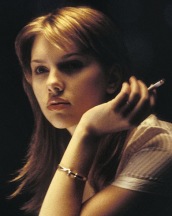 Scarlett Johansson as Charlotte in Lost in Translation. |
The movie that brought Johansson to Redford 's attention was Lisa Krueger's critically acclaimed Manny & Lo. As a girl who escapes a foster home with her sister, Johansson earned an Independent Spirit nomination for Best Female Lead. After Horse Whisperer, Johansson appeared in An American Rhapsody, Eight Legged Freaks, the Coen Brothers' The Man Who Wasn't There, and the film for which she was best known prior to 2003, Terry Zwigoff's Ghost World. For that film, the Toronto Film Critics Association awarded her the Best Supporting Actress prize.
With four Academy Award nominations including Best Picture, Lost in Translation has accounted for the lion's share of the attention Johansson now enjoys. But it is with her haunting, emotionally repressed performance as the 17th-Century Dutch housemaid Griet in Pearl Earring that Johansson proves she belongs firmly in the top tier of film actors. In the film's climactic scene, Johansson is required to transform herself into the girl portrayed in painter Johannes Vermeer's masterpiece. Without saying a word—barely even moving, in fact—Johansson, who doesn't even much resemble the girl, becomes so much like her it's uncanny. As director Peter Webber told AboutFilm in a recent interview, “That's acting.”
Johansson is one flavor of the moment who will linger long past the successes of 2003, and wonder of wonders, she hasn't had to take off her clothes to capture attention. With at least fifteen years before she has even to worry about the bane of Hollywood women—the appearance of lines on her face—Johansson is positioned for a huge career, with no foreseeable expiration date. Oh, and she wants to direct.
Last fall, before the Golden Globe nominations were announced, AboutFilm caught up with Johansson during her press tour in support of Pearl Earring. With spiky bleach blond hair and wearing a vintage sweater, the not-yet-nineteen (at the time) Johansson looks much younger than Lost in Translation 's twenty-something Charlotte. Once Johansson begins to speak to the journalists seated around the table, it's a different matter. Her seriousness and intelligence suggest maturity far beyond her years—no surprise that she has usually been cast as older characters.
[Read the AboutFilm review of Girl with a Pearl Earring]
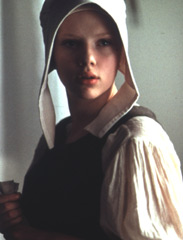 Scarlett Johansson plays a 17th-Century Dutch housemaid in Girl with a Pearl Earring. |
Question: Did you grab the part in Girl with a Pearl Earring as soon as it came to you, or did you have to think about it?
Johannson: I had to audition for it. I wanted to do it as soon as the script came to me, but I went in for a reading, and originally didn't have the part, actually, which I was quite upset about. [laughs] But you learn to deal with those things. You do it for so long and you learn to accept that things work out for the better. Then I was shooting The Perfect Score in Vancouver, and Andy [Paterson] and Peter [Webber]—our producer and our director—came, as Peter says, crawling on a gravely floor on his hands and knees with weights on his feet, to fish me back. At first I was like, “No!” because I wanted to make sure that it was really so, if he really thought that I was right for the part, or whether it was circumstantial. So, little bit of coaxing, I was like, “Mmm—okay! I'll play it.” And that's the way it went.
Question: Had you read Tracy Chevalier's novel before you played Griet?
Johannson: I hadn't. I didn't read it before, and I didn't read it during. I didn't want the first person narrative, I suppose. I just didn't want anyone else's explanation of the way the character was feeling. I didn't want to have the pressure of that. You know, some actors might have, but I don't know, it just didn't seem right.
AboutFilm Question: It's an astonishingly different role from the others we've seen you in. What adjustments did you make in your process and your approach?
Johannson: Well, I don't know that I approached it in any other way than I normally would. Everything you do is different, and you find different chords in every character that you play that strike true with you. But, I didn't have much time. I wrapped Lost in Translation ten days before we started shooting. So I came out of Lost in Translation, and I was like, “Whoa! Oh my god! What just happened? That was crazy!” It was so fast. It was so rushed. It was crazy, and a lot of pressure for the time—we could only be in Tokyo for so long. So I basically unpacked my bags, repacked, and left. When I got [to Luxembourg], everybody was really accepting of where I had come from. Everybody knew that I was a little out of my mind, and I was still quite emotionally vulnerable, so I figured that I would just stay that way, and everything would be all right. [laughs] So I stayed that way for another couple months. A lot of things were prepared already when I got there, which was very reassuring. I was handed a mop and a bucket and told to figure out what to do with them. So I had all these props, and I just figured that if I pretended that I knew what I was doing—what brushes were used to dust what mantelpieces and that kind of thing—people would just kind of buy it.
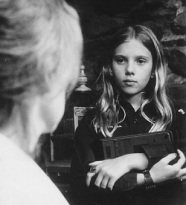 Scarlett Johansson as a girl in Manny & Lo. |
AboutFilm Question: Clearly then, since you had so little time, the British accent that you used to be consistent with the other actors must have already been part of your acting arsenal.
Johannson: Yeah, that's actually a strong point for me. I'm good with dialect. Some actors do it immediately; other actors never quite get it. It's something I've always really enjoyed and something I've always been pretty fast with. At first it was a little bit shaky, and I was taking a lot of line readings from the dialect coach just to get the intonation down, and eventually it became quite second nature, after about a week or two.
Question: You're on a very fast ride now. You're only eighteen, I guess, and you started work at eight? You started as a child and now you're a young woman. Has it seemed crazy, this last ten years? How are you coping with all that, and how have you coped?
Johannson: Well, it hasn't always been crazy. I mean, obviously filming and working has consistently been a part of my life. I've never had a huge break of time when I wasn't working on something or promoting something. There's been chunks of time when I was just in school or whatever, which is nice. This past year has been really insane. It's been quite a whirlwind. I've been really busy, pulled in a lot of directions, but it's great. I really need a vacation, but aside from needing a vacation, it has been so wonderful to feel recognized when you put your hard work into something. I have two films out this year that I'm really proud of and really worked hard on, and so it's okay. I'm just trying to keep my head on straight. I worked this summer on something, and I'm working now, so I'm just in work mode, and that prevents me from going into the Hollywood starlet mode, I suppose.
Question: Who helps you keep your head on straight?
Johannson: My close friends and my family. My parents and my siblings. I don't think I need too much help. I think my head's on pretty straight, and I'm pretty realistic about things. I'm very focused, so that certainly prevents me from going all over the place. I've always been very focused on my career. I think that helps. But, it's good to have people [say], “Okay, you need a vacation.” “I do? Oh yeah, you're right. I think I do.”
Question: How much are you hearing so far about the Oscar buzz around Lost in Translation ? Are you hearing a lot yet? Are you doing things to help with that at all?
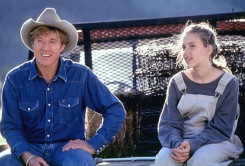 Scarlett Johansson with Robert Redford in The Horse Whisperer. |
Johannson: Yeah, certainly, all of the publicity you do for something is toward— Especially when it comes out this time of year.
Question: But it seems like it's ongoing publicity for that one. The buzz has really increased, and it's been playing for awhile now.
Johannson: People have asked that of me a lot, what if, what if, and that kind of thing. It seems quite unbelievable. There's very few situations where you actually think something like that is going to be a possibility, and I just can't— There's so many things the film should be recognized for—both films—for cinematography, and direction, and writing, that you can't expect something like that. It seems very unbelievable. A couple weeks ago I was trying on dresses, and somebody said, “Oh my god, that's an incredible dress. You have to wear that to the Globes!” And I looked at them and was like, “The Golden Globes?” And they're like, “Of course! You have to borrow it. It's amazing! It's made for your body!” And I was like, “Uh, I plan on eating Chinese food at home that day, but thanks for the invite. If I'm invited I'll call and let you know.” So, I guess I take that in stride, that sort of buzz.
Question: You are eighteen years old, and you have been paired romantically on film with someone in their fifties and someone in their forties. And your next film, The Perfect Score, you're playing someone your age. Do you have any opinions about that? Are you excited about finally playing a character more your own age?
Johannson: Well, Greit was my age, and I've always played a few years older. When we did Horse Whisperer I was twelve playing fourteen. In Ghost World I was fifteen playing eighteen. It doesn't make so much of a difference.
Question: But specifically the romantic pairings with Bill Murray [in Lost in Translation], Colin Firth [in Girl with a Pearl Earring], Billy Bob Thornton [in The Man Who Wasn't There], do you have any opinions on that?
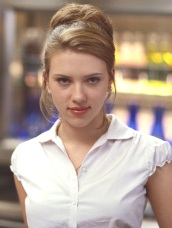 Scarlett Johansson plays a misfit teen in Ghost World. |
Johannson: I think the relationships between the characters are so different. With Billy [Bob Thornton] and I it was kind of a purely innocent sort of thing. With Bill [Murray] and I, my character needs the Bob Harris character to help her from having a total nervous breakdown. She needs his support. Colin [Firth] and I, we have a different relationship. We don't need each other; we want each other. You think that my character could survive anything—she could survive another world war. She's so strong. Colin does not help her come unscathed out of that household. It's her own inner strength that does.
Question: In Girl with a Pearl Earring, Griet was fifteen, sixteen when she first went to work in Vermeer's household. That was a little different from a love affair. It's the interchange between the servant and the master, between the model and the artist. She was intrigued by the art—things an uneducated girl would not have been exposed to. What did you take into consideration as you developed the role?
Johannson: Yeah, those relations are part of the reality of her being in that household. Certainly she's a servant. She's a maid. She's taking care of the cooking and the cleaning and the rearing of the children—all of those things which would be her job—as well as the model in the end. She's forced into that seat. However, it became more apparent to me, the more we filmed, how completely in love I was falling with Colin as the Vermeer character. It became more and more apparent to me that the Vermeer character was this untouchable mysterious man, this genius, and my character was completely longing and obsessive and in love with this man. It was actually physically heartbreaking; that's how apparent it became. [In the scene] when I saw the Vermeer and Catharina [Vermeer's wife] characters together, caressing each other, I was physically pained, in my heart, by that. I definitely think that the love affair for me was the most apparent relation between the two characters. The maid and the model are things that come along with the circumstance, but the other is not physical.
AboutFilm Question: I think that definitely came through, watching the film. Is that how Peter Webber and the other people involved also saw it, or is that a realization you came to on your own?
Johannson: I don't know. I never really talked to anyone about it. I think it's kind of personal, the way you see it. I didn't necessarily want to tell anyone, except for after that one particular scene. I remember it so clearly, it was like, “And cut! Great! Print! Lunch!” And I was [mimics hyperventilating] , “Uu-uh-uh.” I was totally messed up. Everybody was getting their shit together to go to lunch, and I was not getting my shit together. It was terrible, and I finally went to the lunch table and said, “You guys, I feel really bizarre. This is very strange. I'm not hungry. I feel weird. I need to talk to somebody about this.” I think everyone was like, “Why don't you go to your trailer and lie down?” And I was like, “That's a good idea! I will do that! Thank you!” I went back to my trailer and had a good cry and a nap, and I was fine. But, I don't know, I never really spoke to anyone else about that, because I think it's very personal.
Question: Lost in Translation may not be a biography of Sofia Coppola and her relationship with Spike Jonze, but there are a lot of similarities. In her direction, did you feel any of that coming out when she was directing you—any of her personality, any of her life? Were you thinking about that at all when you were making the film?
Johannson: Well of course, her personality came through when she was directing me. It's not like she [pressed] her director button and changed. Every director is themselves; [they're] not playing a part. But, Sofia wrote this script and I think that the story is very familiar to her. I think that she wrote about herself—experiences that she had as a young girl in her twenties. I think that she found the idea of this very preppie girl, married and well-off, having a mid-life crisis at the age twenty-four, very interesting, and funny. Ironically funny. And so—I don't know, I guess I never thought about it. My whole wardrobe was Marc Jacobs, so [it] was apparent that she had a say in that. She wanted [her] to be cool—her version of cool, and kind of preppie. The character always had long blonde hair, and that was to separate her from the Japanese. I guess the relationship with Giovanni [Ribisi] is similar in the sense that they're both busy. He's busy and focused, and she's floating around not really knowing what she wants, and he doesn't get that. But it wasn't like she said, “When I was sitting in the room, I was alone and thinking that—” It wasn't like that; it was very much separate. She didn't have an affair with an older man in Tokyo or anything like that.
Question: What's your relationship with John Travolta in Love Song for Bobby Long ? Can you tell us a little bit about that?
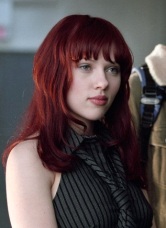 Scarlett Johansson wears a wig in The Perfect Score. |
Johannson: Well, the film is about a girl that, when we find her, is living in a trailer park in Florida. Within the first four pages of the script, she gets this letter that her mother has died, and she has to go to New Orleans for the funeral. So she makes this trek to New Orleans; she gets there, and she goes to this house that her mother has apparently left her. She hasn't seen her mother mostly her whole childhood—the last time she saw her, she was like eleven. She doesn't even remember her, really. And so she opens the door—it's a disheveled dump, and Gabriel Macht and John Travolta are living there. John Travolta, especially, is lascivious, awful. Everything about him is gross and terrible—he's hysterical. They also apparently have a share of the house. They've been living there for some time, about six or seven years. She's welcome to come stay if she'd like to, but this is the way it's going to be. There's these two really gross awful men walking around the house in their underwear. So she leaves the house, she's all flustered, and she figures, “What am I going to do?” She doesn't really have any place to go. So she reads The Heart is a Lonely Hunter and she decides to come back. It's about the three characters living together, forming this very strange kind of family. The Bobby Long character [Travolta] and Gabriel's character are these Tennessee Williams protagonists—they have these lousy pipe dreams about themselves. John is playing a washed up English professor, and Gabriel is his student, and she's this beacon of light in the household, and in turn is learning about the mother she never really knew through the people that knew her.
Question: Can you tell us a little bit more about yourself? Do you live at home still? What sort of education have you been able to have, and do you plan to pursue it any further?
Johannson: Well, I don't plan on going any further. I've graduated from high school. I was an honor student. I grew up in New York , was born and raised there. I live in New York partly, and I live in LA by myself partly. And yeah, I was supposed to go to school for film direction this year, but I decided not to go because it didn't really make any sense to me, to go to school for something I've been involved with for so long. The things that I really wanted to go to school for I could [study] separately, like film history and post-production editing.
Question: So you're fairly independent at your age. Would you describe yourself that way?
Johannson: Yeah, I am very independent. I mean, I still need a lot of love and care. But I'm independent; I can take care of myself.
Question: And you're already thinking of starting your own production company and stepping behind the camera?
Johannson: Well, every actor has a production company already. It's just a matter of producing your own films under the label of your own production company.
Question: But some production companies are more in name only. Some are just a power thing, and some are actually really involved in finding projects.
Johannson: Yeah, exactly. I don't know necessarily that I would produce under my own company right now. Producing is not something that I'm thinking about. Directing is something that I will be doing very shortly, trying to figure out what to get my hands on. And I can't imagine writing a script and wanting to direct it and not having a producing credit, because I would want to have a big chunk of power on that end, if I wrote something.
[Read the AboutFilm review of Girl with a Pearl Earring]
[Read the AboutFilm interview with director Peter Webber]
[Read the AboutFilm profile & interview with co-star Colin Firth]
Feature and Interview ©
February 2004 by AboutFilm.Com and the author.
Images © 2003 Lions Gate Films. All Rights Reserved.